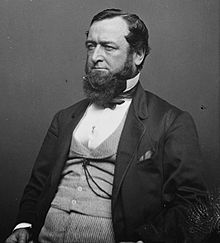| Charles Russell Train | |
|---|---|
 | |
| 16th Massachusetts Attorney General | |
| In office 1872–1879 | |
| Governor | William B. Washburn Thomas Talbot William Gaston Alexander H. Rice |
| Preceded by | Charles Allen |
| Succeeded by | George Marston |
| Member of the U.S. House of Representatives from Massachusetts's 8th district | |
| In office March 4, 1859 – March 3, 1863 | |
| Preceded by | Chauncey L. Knapp |
| Succeeded by | John D. Baldwin |
| District Attorney of Middlesex County, Massachusetts | |
| In office 1853–1855 | |
| Preceded by | Asa W. Farr |
| Succeeded by | Isaac S. Morse |
| In office 1848–1851 | |
| Preceded by | Albert H. Nelson |
| Succeeded by | Asa W. Farr |
| Member of the Boston Common Council | |
| In office 1867 | |
| Member of the Massachusetts Governor's Council | |
| In office 1857–1856 | |
| District Attorney of Middlesex County, Massachusetts | |
| In office 1853–1855 | |
| In office 1848–1851 | |
| Member of the Massachusetts House of Representatives | |
| In office 1847–1848 | |
| Personal details | |
| Born | (1817-10-18)October 18, 1817 Framingham, Massachusetts |
| Died | July 29, 1885(1885-07-29) (aged 67) North Conway, New Hampshire |
| Resting place | Edgell Grove Cemetery, Framingham, Massachusetts |
| Political party | Republican |
| Children | Charles Jackson Train Arthur Cheney Train |
| Alma mater | Brown University |
| Profession | Law |
| Signature | |
Charles Russell Train (October 18, 1817 – July 29, 1885) was an American lawyer and politician who served two terms as a U.S. Representative from Massachusetts from 1859 to 1863.
Early life and education
Charles Russell Train was born in Framingham, Massachusetts on October 18, 1817. He attended the common schools, Framingham Academy, and was graduated from Brown University, Providence, Rhode Island, in 1837.
Train studied law at Harvard University. Train was admitted to the bar and commenced practice in Framingham, Massachusetts in 1841.
Political career
Train served as a member of the Massachusetts House of Representatives in 1847 and 1848.
From 1848 to 1851 and 1853 from 1855, Train was district attorney of Middlesex County, Massachusetts. He declined the appointment of Associate Justice of the Supreme Court of the United States in 1852.
Train served as delegate to the Massachusetts Constitutional Convention of 1853.
Train served as delegate to the Republican National Convention in 1856 and 1864.
Train served as member of the Massachusetts Governor's Council in 1857 and 1858.
Congress
Train was elected as Republican to the Thirty-sixth and Thirty-seventh Congresses (March 4, 1859 – March 3, 1863).
Train served as chairman of the Committee on Public Buildings and Grounds (Thirty-sixth and Thirty-seventh Congresses). He was not a candidate for renomination in 1862.
Train was one of the managers appointed by the House of Representatives in 1862 to conduct the impeachment proceedings against West H. Humphreys, United States judge for the several districts of Tennessee. During the Civil War, Train served in the Union Army as a volunteer aide-de-camp to General George B. McClellan.
Massachusetts attorney general
Train moved to Boston, Massachusetts.
In 1867, Train served on the Boston Common Council.
Train again served in the Massachusetts House of Representatives from 1868 to 1871.
Train was elected Massachusetts Attorney General from 1872 to 1879, after which he resumed the practice of law.
Death and burial
Train died while on a visit in North Conway, New Hampshire, July 29, 1885. He was interred in Edgell Grove Cemetery, Framingham, Massachusetts.
See also
References
- ^ United States Congress. "Charles R. Train (id: T000352)". Biographical Directory of the United States Congress. Retrieved July 10, 2023.
- ^ Davis, William T., ed. (1894). Professional and Industrial History of Suffolk County, Massachusetts. Vol. I. The Boston History Company. p. 341. Retrieved July 10, 2023 – via Internet Archive.
- Conklin, Edwin P. (1927). Middlesex County and Its People. New York: Lewis Historical Publishing Company. p. 119. Retrieved August 6, 2023.
- Members of City Government 1910-2009. Retrieved 2010-03-31
- ^ "Charles Russell Train: Sudden Death of the Ex-Attorney-General". The Boston Globe. July 29, 1885. p. 4. Retrieved July 10, 2023 – via Newspapers.com.
![]() This article incorporates public domain material from the Biographical Directory of the United States Congress
This article incorporates public domain material from the Biographical Directory of the United States Congress
| U.S. House of Representatives | ||
|---|---|---|
| Preceded byChauncey L. Knapp | Member of the U.S. House of Representatives from Massachusetts's 8th congressional district 1859–1863 |
Succeeded byJohn D. Baldwin |
| Legal offices | ||
| Preceded byCharles Allen | Attorney General of Massachusetts 1872–1879 |
Succeeded byGeorge Marston |
| Chairs of the United States House Committee on Transportation and Infrastructure | ||
|---|---|---|
| Public Buildings and Grounds (1837–1947) |  | |
| Rivers and Harbors (1883–1947) | ||
| Roads (1913–1947) | ||
| Flood Control (1916–1947) | ||
| Transportation and Infrastructure* (1947–) | ||
| Note | Alternately named Public Works in 80th through 93rd Congresses and Public Works and Transportation in 94th through 103rd Congresses. | |
- 1817 births
- 1885 deaths
- Harvard Law School alumni
- Republican Party members of the Massachusetts House of Representatives
- Massachusetts attorneys general
- District attorneys in Middlesex County, Massachusetts
- Union army officers
- Brown University alumni
- Politicians from Boston
- People of Massachusetts in the American Civil War
- Republican Party members of the United States House of Representatives from Massachusetts
- Lawyers from Boston
- 19th-century American lawyers
- 19th-century members of the Massachusetts General Court
- 19th-century members of the United States House of Representatives

